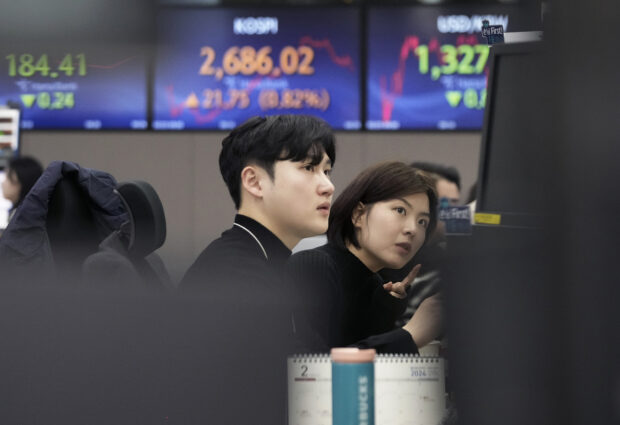
Currency traders watch monitors at the foreign exchange dealing room of the KEB Hana Bank headquarters in Seoul, South Korea, Friday, Feb. 23, 2024. (AP Photo/Ahn Young-joon)
HONG KONG — Asian markets were mostly higher on Friday after Nvidia delivered stunning results, setting off a rally in other technology companies that carried Wall Street to another record high.
Tokyo’s markets were closed for a holiday, a day after they surged to an all-time high.
U.S. futures rose while oil prices fell back.
Hong Kong’s Hang Seng dropped less than 0.1 percent to 16,728.00 and the Shanghai Composite index added 0.4 percent to 3,001.38.
Government data on Wednesday showed few signs of recovery in China’s real estate market, as prices of new homes in first-tier cities fell 0.4 percent in January from a month earlier, extending a downward trend.
The property sector accounts for nearly a third of China’s economic activity and the industry-wide meltdown has weighed on growth and sapped the confidence of both investors and consumers.
READ: Nvidia fuels global stock records, bond yields rise
Markets were mostly higher elsewhere in Asia.
Australia’s S&P/ASX 200 was up 0.4 percent at 7,643.60, and the Kospi in Seoul added 0.2 percent to 2,670.40.
In India, the Sensex gained 0.2 percent and Bangkok’s SET fell 0.2 percent .
On Thursday, the S&P 500 rose 2.1 percent to 5,087.03, an all-time high. The Nasdaq rose 3 percent to 16,041.62.
The Dow Jones Industrial Average, which has a smaller weighting in tech stocks, jumped 1.2 percent , to 39,069.11. That marks its first close above 39,000.
Nvidia’s stock price surged Thursday after delivering another blowout quarter, setting off a rally in other technology companies that carried Wall Street to another record high.
Chipmakers gain ground
The chipmaker, which soared 16.4 percent , reported scorching demand for its semiconductors. Its stock has tripled over the past year thanks to a surge in investor enthusiasm for artificial intelligence. Synopsis, which makes software used to test and develop chips, rose 6.9 percent after raising its profit forecast.
Other chipmakers and companies involved in the chipmaking industry also gained ground. Advanced Micro Devices rose 10.7 percent and Lam Research added 4.7 percent .
READ: Nikkei parties like it’s 1989; scales record high
Technology stocks have been the driving force behind the market’s rally that started in October. Solid earnings from some of the biggest names in the sector are helping justify and reinforce those gains.
Wall Street expects just under 4 percent growth for earnings in the overall S&P 500 during the fourth quarter. The communication services sector, which includes Google’s parent Alphabet, is expected to report 45 percent growth. Information technology companies, which include Nvidia, are expected to notch 22 percent growth.
“The near-term momentum in AI-related stocks is likely to continue,” said Solita Marcelli, chief investment officer for the Americas at UBS Global Wealth Management.
Nearly 90 percent of companies in the S&P 500 have reported earnings. There are still a few big names left to report over the next several weeks, including Lowe’s, Dollar Tree and Best Buy.
Wall Street focuses on earnings
Wall Street’s focus on earnings this week follows economic data from the previous week that prompted a stumble in the market. Inflation data came in hotter than Wall Street expected, while retail sales fell more than anticipated. That raised concerns about the timing of hoped-for interest rate cuts from the Federal Reserve.
Wall Street is now betting that the central bank will start trimming its benchmark rate in June, rather than March.
Investors could get more clarity on inflation next week when the government releases its monthly report on personal consumption and expenditures, the Fed’s preferred measure. The Fed is trying to get inflation back down to its target of 2 percent .
Analysts expect that report to show inflation cooled to 2.3 percent in January. It peaked at 7.1 percent in June of 2022.
Bond yields were relatively steady. The yield on the 10-year Treasury rose to 4.33 percent from 4.32 percent late Wednesday.
In energy trading, U.S. benchmark crude oil lost 51 cents to $78.10 a barrel. Brent crude, the international standard, gave up 40 cents to $82.30 per barrel.
The U.S. dollar was trading at 150.65 Japanese yen, up slightly from 150.51 yen. The euro rose to $1.0831 from $1.0827.